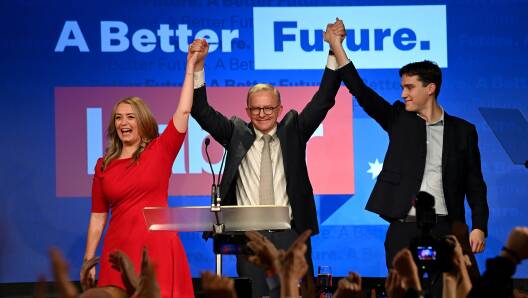“Ngalga nura – we see Country. Ngarala duba – we hear Country”
Albo said that Labour shines a light on the hill not glow nuclear ☢️ in the dark as the liberals want to do …
PM promises ‘fair, reforming’ budget at NSW homecoming
Even Wayne Swan who appointed Chris Jordan as ATO Commissioner in January 2013 invaded Sydney as well and shared the PM’s link ADDRESS TO NSW LABOR CONFERENCE
After months of flooding in NSW; record temperatures across Europe and China; and catastrophe in Pakistan, protesters say urgent action is needed to cut emissions and mitigate the climate crisis.
~Matraville incinerator banned
At the start of every new government, prime ministers imagine themselves the tamers of chaos. They attempt to reset the operational tempo of politics. This process is invariably interesting because everybody has their own objectives and methodology.
Readers with long memories will recall Tony Abbott coming to the job with a mantra of getting politics off the front page. This was always pretty ironic, given he’d unleashed pure bedlam to delegitimise Julia Gillard, the stoic, who had implored the media to not write crap. Abbott rode the pandemonium to the Lodge, but once unleashed, it proved impossible to subdue. Politics remained on the front page and his prime ministership was over in two years.
The Battleship Albanese is a paragon of calm but in the water lurks Dutton, looking for cracks in the armourIt’s a political risk, but Anthony Albanese goes all in on the Voice
The key difference between the Yes vote on same-sex marriage and the Voice referendums is that there was already strong majority support among the Australian public.
Since Federation, there have been 19 referendums, proposing 44 changes to the Constitution. Just eight have been carried.
The last referendum to achieve the requisite double majority – 50 per cent-plus of the national vote, and the support of at least four of the six states – was held in 1977.
That was a series of proposals put forward by the Fraser government pertaining to filling casual vacancies in the Senate, the retirement age of judges, and allowing residents of territories to vote in referendums.
The last referendum proposed by a Labor government and which was carried – giving the Commonwealth power to legislate a range of social services – was held in 1946, almost 80 years ago.
The last referendum held was the 1999 republic referendum, which went down the gurgler. The next, to be held sometime in 2023-24, will be to enshrine in the Constitution a Voice to parliament – a body representing Aboriginal and Torres Strait Islander peoples to advise the parliament and government on laws and policies related to Indigenous Australians.
Against this historical backdrop of failure, Anthony Albanese is investing his all in a Yes vote, giving it the full imprimatur of his office and his government.
When the Queen died, Albanese dismissed calls to reignite the republic debate as of secondary importance. Nothing, he said, was more important that recognising the original inhabitants of our land.
The government is under no illusions as to how difficult success will be.
It’s a political risk but good on him for having a crack at something he believes in. Remember conviction?
The biggest criticism thus far is the lack of detail as to what the actual proposal will be and how the Voice would work if established.
This, we are assured, will be well explained before people are asked to vote. Indigenous Affairs Minister Linda Burney is leading consultations with Indigenous leaders in a bid to achieve as broad a consensus as possible before formulating the final proposition.
It’s a political risk, but Anthony Albanese goes all in on the Voice
NSW Labor pledges to boost transport and teaching staff ahead of 2023 election bid
Chris MinnsUnions NSW says state data privacy laws are too easily abused by employers
Unions NSW says the state needs an agency to oversee data laws and tighten existing regulations.
The peak union body in NSW wants an urgent overhaul of that state’s current data and privacy laws, and has criticised how easily employers are able to monitor their staff’s emails, phone calls and movements with little regulation.
Prime Minister Anthony Albanese cleared the policy with federal cabinet ministers on Friday to extend the existing scheme by 2026 after months of pressure from the Greens and “teal” independent MPs to be more generous.
Albanese pledges to pay for six months’ parental leave
But, along the way, he’s spoken to a number of audiences about citizens’ assemblies. Including the Albanese government’s Assistant Minister for the Republic, Matt Thistlethwaite.
Thistlethwaite is interested: “We are considering it for the republic, particularly as a means of educating Australians about the issue and trying to come to a consensus about the model,” he tells me. “I’m deeply conscious that the monarchists in the 1999 referendum called it a politicians’ model.”
“Looking at the facts, hearing from both sides, making recommendations to government without politicians’ involvement – it’s definitely worth considering,” Thistlethwaite says. “A big issue will be explaining to younger people; they’re looking for more transparency and accountability in the way government operates. I think this is a great way to look at an issue, engage Australians and give them a voice.
The Irishman who could shape Australia’s future, to be sure
ANTHONY ALBANESE, PRIME MINISTER: Well thanks very much, Ed, and thanks for coming to Marrickville today.
‘Services at the coalface’: Community legal centre sector unveils law reform platform
“I am delighted to confirm the return of the Prime Minister’s XI this summer, an Australian tradition that spans 70 years,” Albanese said in a statement.
